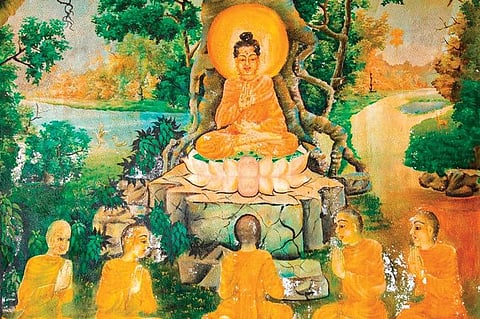

Dukha is an important concept in Hinduism, Buddhism and Jainism. It does not have an exact translation in English, but may be roughly translated as suffering or ill-being, as opposed to sukha or well-being. Dukha may be defined as the spectrum of feelings we experience in our day-to-day life, from mild annoyance to intense pain. We may experience dukha due to physical factors like sickness, injury, old age, or emotional factors like separation from loved ones, hurting of our feelings by others, or a feeling of general dissatisfaction that the world is not the way we want it to be. It is interesting to note that dukha has been given a very prominent place in religious philosophies that originated in India.
Dukha is mentioned in the first of the four noble truths in Buddhism. It states: life is dukha. It means that a basic unsatisfactoriness pervades all living beings because of the changing and impermanent nature of life. It may be called the central concept in Buddhism and most of Buddha’s teachings were centred around understanding and overcoming dukha. It is only once you have studied the nature and causes of dukha, that you can move towards transcending it.
In Hinduism, there is, again, a recognition of the pervasiveness of dukha due to the gulf between desires or expectations and actual experience. The way out of dukha is to understand the real nature of self (atman) and the ultimate reality (brahman). In the earliest Upanishads, like the Brihadaranyaka and Chandogya, and also the Bhagavad Gita, this has been emphasised as the path out of dukha and towards moksha (liberation).
Indian philosophies that ask one to embrace dukha may appear to be, but are not pessimistic. They are realistic in recognising that the world is full of suffering and define the objective of life as overcoming that suffering and attaining moksha or permanent bliss. If one wishes to allow only sukha into one’s life and run away from dukha, it will keep showing up whenever the influence of sukha gets weak. It may be wishful thinking to hope for a life free of dukha. It is better to learn how to deal with the dukha that will inevitably arise in our life from time to time.
The superhit 1964 release Hindi movie, Dosti, about two physically challenged friends who constantly refuse to bow down in the face of suffering has an immortal song whose opening line aptly captures the attitude of Indian philosophy towards suffering.Dukh ho ya sukh, jab sada sang rahe na koye Phir dukh ko apnaaiye, ke jaye to dukh na hoye Suffering or happiness, nothing remains forever, therefore,Embrace suffering, so that when it leaves there is no suffering.